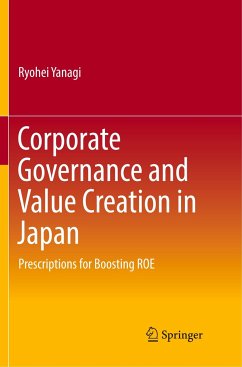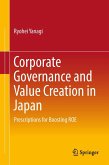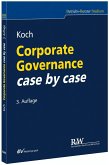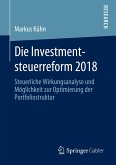This is the first book to furnish a root cause of the low valuation of Japanese listed companies by using, as qualitative evidence, unique global investor surveys, which are rarely available for Japanese companies. Also contained in this book as quantitative evidence is empirical research with regression analysis implying a positive correlation between corporate governance and value creation in Japan.
The author explains the rationale underlying the suggestion of the Ito Review on return on equity (ROE) 8% guidance, an almost 50% discounted valuation of the cash held by Japanese companies, corporate value and ROE, equity spread as a key performance indicator for value creation, an optimal dividend policy based on optimal capital structure, risk-adjusted hurdle rates for value-creative investment criteria, and the synchronization of environmental, social, and governance with equity spread.
Illustrated with relevant statistics, evidence of shareholders' voices, case studies, and empirical research, the book is highly recommended for readers who seek qualitative and quantitative evidence of Japan's problems and potential prescriptions in connection with value creation.
"This book empirically proves the relationship between non-financial capitals defined by IIRC and corporate value, and provides a convincing method to unlock corporate value in Japan via Abenomics corporate governance reforms. A must read!"
Richard S. Howitt, Chief Executive Officer, International Integrated Reporting Council (IIRC)
"This book addresses emerging issues such as the "Power of Intangibles" in addition to IMA-defined "Equity Spread" as a gauge for value creation from the viewpoint of management accounting. It is highly recommended for finance and accounting professionals."
Jeffrey C. Thomson, CMA, CAE. President and CEO, Institute of Management Accountants (IMA)
The author explains the rationale underlying the suggestion of the Ito Review on return on equity (ROE) 8% guidance, an almost 50% discounted valuation of the cash held by Japanese companies, corporate value and ROE, equity spread as a key performance indicator for value creation, an optimal dividend policy based on optimal capital structure, risk-adjusted hurdle rates for value-creative investment criteria, and the synchronization of environmental, social, and governance with equity spread.
Illustrated with relevant statistics, evidence of shareholders' voices, case studies, and empirical research, the book is highly recommended for readers who seek qualitative and quantitative evidence of Japan's problems and potential prescriptions in connection with value creation.
"This book empirically proves the relationship between non-financial capitals defined by IIRC and corporate value, and provides a convincing method to unlock corporate value in Japan via Abenomics corporate governance reforms. A must read!"
Richard S. Howitt, Chief Executive Officer, International Integrated Reporting Council (IIRC)
"This book addresses emerging issues such as the "Power of Intangibles" in addition to IMA-defined "Equity Spread" as a gauge for value creation from the viewpoint of management accounting. It is highly recommended for finance and accounting professionals."
Jeffrey C. Thomson, CMA, CAE. President and CEO, Institute of Management Accountants (IMA)








